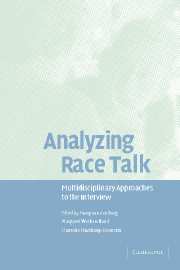Book contents
- Frontmatter
- Contents
- List of contributors
- Preface
- Acknowledgments
- Transcriptions symbols
- Introduction
- 1 Racism and the analysis of cultural resources in interviews
- 2 Analyzing racial discourse: the discursive psychology of mind–world relationships
- 3 Constructivist processes in discourse: a cognitive linguistics perspective
- 4 Institutional, professional, and lifeworld frames in interview talk
- 5 The uses of absurdity
- 6 Multiple voices in talking race: Pakeha reported speech in the discursive construction of the racial other
- 7 Contradictions in interview discourse
- 8 Racism, happiness, and ideology
- 9 The frame analysis of research interviews: social categorization and footing in interview discourse
- 10 Affiliation and detachment in interviewer answer receipts
- 11 Interviewer laughter as an unspecified request for clarification
- 12 Perspectives and frameworks in interviewers' queries
- Appendix: Interview transcripts
- Index
8 - Racism, happiness, and ideology
Published online by Cambridge University Press: 22 September 2009
- Frontmatter
- Contents
- List of contributors
- Preface
- Acknowledgments
- Transcriptions symbols
- Introduction
- 1 Racism and the analysis of cultural resources in interviews
- 2 Analyzing racial discourse: the discursive psychology of mind–world relationships
- 3 Constructivist processes in discourse: a cognitive linguistics perspective
- 4 Institutional, professional, and lifeworld frames in interview talk
- 5 The uses of absurdity
- 6 Multiple voices in talking race: Pakeha reported speech in the discursive construction of the racial other
- 7 Contradictions in interview discourse
- 8 Racism, happiness, and ideology
- 9 The frame analysis of research interviews: social categorization and footing in interview discourse
- 10 Affiliation and detachment in interviewer answer receipts
- 11 Interviewer laughter as an unspecified request for clarification
- 12 Perspectives and frameworks in interviewers' queries
- Appendix: Interview transcripts
- Index
Summary
In 1775 Thomas Jefferson wrote in the famous opening words of the American Declaration of Independence: “We hold these truths to be self-evident, that all men are created equal, that they are endowed by their Creator with certain unalienable rights, that among these are life, liberty and the pursuit of happiness.” The pursuit of happiness has become a fundamental individual right laid down in several key ideological texts. People have a right to be happy, and if they are not happy something has to be done about it. In this chapter I am interested in the way that this old notion of happiness functions in present-day racist talk, that is, in discourse that explains and justifies the exclusion of minority groups.
In general a distinction can be made between analytical approaches that focus on the structure of a text or talk, and those that focus on the content. Although structure and content cannot be easily separated, such a distinction is often made. For example, in his book The uses of argument, Toulmin (1958) distinguishes between the structure or procedure of argumentation, which he considers independent of the topic under discussion, and the kinds of justifications used in argumentation, which are topic dependent (see also Perelman and Olbrechts-Tyteca 1971). An emphasis on structure may involve a study of discursive devices, linguistic forms, and the sequential organization of texts and talk, whereas an emphasis on content may focus on cultural meanings used to define and justify specific representations.
- Type
- Chapter
- Information
- Analyzing Race TalkMultidisciplinary Perspectives on the Research Interview, pp. 138 - 155Publisher: Cambridge University PressPrint publication year: 2004
- 1
- Cited by



